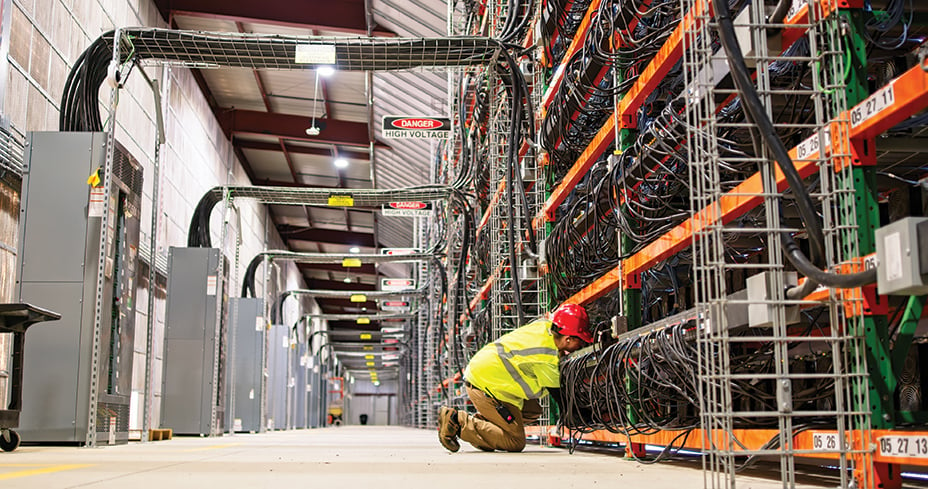Listen to this article
This audio is generated using AI

Anta flagship store in Shanghai, China. ©Bloomberg/Getty Images
As with any investment, your capital is at risk.
For L’Oréal, last year was another to forget. Sales in China, the dynamo that once supercharged the French cosmetics giant’s global growth, continued to slump. Shares in the company fell 20 per cent during 2024.
Since China’s post-Covid property bust took hold, shoppers in Shanghai and Shenzhen have resisted foreign luxuries. Lipstick and skincare products from Paris have not proved must-haves. And bankers’ research notes warned of further woe for L’Oréal in 2025, some reiterating their advice to sell.
We were unconvinced by talk of it becoming a normal ‘cyclical’ business, tied to macroeconomic ups and downs and destined for lower growth. We bought more of the stock in 2023 and again in 2024 for some of our clients' portfolios.
We didn’t feel that the Chinese slowdown represented fundamental change. It was a rare opportunity for us to purchase a great business at a fair price.
We know that wobbles happen, even to the best-run businesses. Often it’s a case of something misfiring – a division underperforming or a slowdown in a particular region.
Such accidents are an opportunity if we’re convinced that the underlying positive case for the company remains strong. Often they’re ones we’ve previously coveted but found the valuation too rich.
Our investigative research into L’Oréal went far beyond a study of its profit and loss account, beyond meetings with chief executives and chief financial officers and the slick presentations that investor relations departments love to give. Everyone sees those.
Beyond analyst reports
We dug deeper, interviewing former employees and industry experts. That helped us to see things differently. It convinced us that L’Oréal has a culture of entrepreneurialism and invention.
For example, its ‘beauty tech’ uses AI to help people confidently pick a shade of makeup and hair colouring to match their complexion. This kind of advantage makes it resilient to setbacks.
It’s not that we disregard headwinds in China, but we don’t think current challenges outweigh that unique culture, the unparalleled levels of dedication and passion in its workforce, and the drive of chief executive Nicolas Hieronimus. He’s promised “blockbuster” new hair product and fragrance launches this year.
And, especially for a company founded in 1909, we’re impressed by its lack of complacency, the constant search for perfection and the training and promotion of young talent through its graduate programme.
Such qualities matter because when we back a company, we want to stay invested for more than a few years. So, too, do impregnable competitive advantage and the abilities to innovate and exploit big growth opportunities.
Searching for great growth
Our mission is to back the great long-term growth compounders.
These are the businesses that, like L’Oréal, can continue investing in themselves in the lean years while competitors retrench and defend their balance sheets.
Another example is Anta Sports, China’s biggest homegrown sportswear brand. Founded in 1991, the firm has grown into a retail conglomerate. In addition to its original mid-range Anta brand, it owns or part-owns Descente, Fila and Amer Sports.
Sales of its premium Fila-branded products contracted last year as cautious Chinese consumers gravitated towards cheaper products.
It would be tempting to look at the group and say that China is slowing down, the stock’s valuation will decline, let’s sell and then come back when times are good. Some investors are very successful at timing such moves. We don’t claim that at Baillie Gifford.
We pay more attention to Anta’s fundamental strengths. These matter more to long-term returns. Its skill at innovating in a super-competitive market has given it revenue growth of nearly 20 per cent per annum over the last decade. It has also proven its abilities to convert investment into profit and generate cash for shareholders while spending heavily on expansion plans.
As for growth opportunities, there are plenty. We think the ‘athleisure’ trend in its home market has a long way to go. Anta is already expanding its presence in south-east Asia, a potentially vast new market.
Plugging in opportunity
Schneider Electric is another firm that’s weathered tough periods. The French company makes low-voltage power equipment that goes into buildings. In recent months, it’s handled a change in leadership, supply chain bottlenecks and regulatory challenges.
But these hiccups are nothing when weighed against its commanding global position in power management, decarbonisation and increasing automation.
Collectively, these comprise 80 per cent of its turnover and make Schneider a leading player in the global switch from fossil fuels towards electrification. In a market where a few big players get most of the business, it has strong relationships with distributors and can demand a good price for its products and services.
Particularly promising are datacentres, where it’s a leading global equipment supplier. AI datacentres need about four to five times more power than traditional ones, and Schneider is well-placed to provide the components that supply it.

Schneider Electric’s range of datacentre products includes cooling systems
Through innovation, the company’s revenues have grown steadily at around 7 per cent per year over five years. Combine this with Schneider’s ability to increase profits by efficient use of resources, the potential increase in earnings per share could be around 10 per cent.
It’s making equipment that’s difficult to beat in a field where failure can be so catastrophic that customers are wary of lower-cost, less reputable suppliers.
Schneider is a steady operation that uses capital efficiently to grow profits and has plenty of opportunities. It can pay a reliable dividend to shareholders and reinvest for further growth.
A cosmetics company, a sportswear maker and an electrical equipment supplier: for us, such diversification is the key to steadily growing returns, even in downturns in the cycle.
We take time to get to know these great growth businesses and trust them to stay on course despite bumps in the road. And when those bumps inevitably happen, we ask if our fundamental thesis has changed.
No? Then the market’s short-termism can be our opportunity.
Important information
Baillie Gifford & Co and Baillie Gifford & Co Limited are authorised and regulated by the Financial Conduct Authority (FCA). Baillie Gifford & Co Limited is an Authorised Corporate Director of OEICs.
Baillie Gifford Overseas Limited provides investment management and advisory services to non-UK Professional/Institutional clients only. Baillie Gifford Overseas Limited is wholly owned by Baillie Gifford & Co. Baillie Gifford & Co and Baillie Gifford Overseas Limited are authorised and regulated by the FCA in the UK.
Persons resident or domiciled outside the UK should consult with their professional advisers as to whether they require any governmental or other consents in order to enable them to invest, and with their tax advisers for advice relevant to their own particular circumstances.
Financial intermediaries
This communication is suitable for use of financial intermediaries. Financial intermediaries are solely responsible for any further distribution and Baillie Gifford takes no responsibility for the reliance on this document by any other person who did not receive this document directly from Baillie Gifford.
North America
Baillie Gifford International LLC is wholly owned by Baillie Gifford Overseas Limited; it was formed in Delaware in 2005 and is registered with the SEC. It is the legal entity through which Baillie Gifford Overseas Limited provides client service and marketing functions in North America. Baillie Gifford Overseas Limited is registered with the SEC in the United States of America.
The Manager is not resident in Canada, its head office and principal place of business is in Edinburgh, Scotland. Baillie Gifford Overseas Limited is regulated in Canada as a portfolio manager and exempt market dealer with the Ontario Securities Commission (‘OSC’). Its portfolio manager licence is currently passported into Alberta, Quebec, Saskatchewan, Manitoba and Newfoundland & Labrador whereas the exempt market dealer licence is passported across all Canadian provinces and territories. Baillie Gifford International LLC is regulated by the OSC as an exempt market and its licence is passported across all Canadian provinces and territories. Baillie Gifford Investment Management (Europe) Limited (‘BGE’) relies on the International Investment Fund Manager Exemption in the provinces of Ontario and Quebec.

